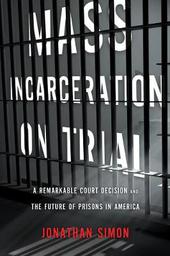
|
Mass Incarceration On Trial: Prisons Before the Constitution
Hardback
Main Details
| Title |
Mass Incarceration On Trial: Prisons Before the Constitution
|
| Authors and Contributors |
By (author) Jonathan Simon
|
| Physical Properties |
| Format:Hardback | | Pages:214 | | Dimensions(mm): Height 216,Width 147 |
|
| ISBN/Barcode |
9781595587695
|
| Classifications | Dewey:344.73035 344.73035 |
|---|
| Audience | |
|---|
|
Publishing Details |
| Publisher |
The New Press
|
| Imprint |
The New Press
|
| Publication Date |
18 September 2014 |
| Publication Country |
United Kingdom
|
Description
For nearly 40 years the United States has been gripped by policies that have placed more than 2.5 million Americans in jails and prisons designed to hold a fraction of that number of inmates. Our prisons are not only vast and overcrowded, they are degrading. Mass Incarceration on Trial examines a series of landmark decisions about prison conditions that has opened an unexpected escape route from this trap of tough on crime' politics. This set of rulings points toward values that could restore legitimate order to American prisons and lead to the end of mass incarceration.'
Author Biography
Jonathan Simon is the Adrian A. Kragen Professor of Law at the University of California, Berkeley. His most recent book, Governing through Crime, won the American Sociology Association's 2008 Sociology of Law Distinguished Book Award and the 2010 Hindelang Prize of the American Society of Criminology. He lives in Berkeley, California.
ReviewsPraise for Mass Incarceration on Trial : "Highly readable, stunning stuff. California is at the epicenter of a new American debate about prison policy and Simon's remarkable book places the state's travails in national and historical context. I recommend it to anyone interested in the problem of prisons in America." -Todd Clear, author of The Punishment Imperative "A masterful job of assessing the qualitative shift in the court's analysis on human rights concerns as they apply to our notorious prison system, the book points the way to a legal strategy premised on human dignity as a means of challenging mass incarceration." -Marc Mauer, executive director, The Sentencing Project, and author of Race to Incarcerate "A powerful critique of California's use of mass incarceration combined with an inspiring vision of a hopeful future created by landmark court decisions." -Jules Lobel, president, Center for Constitutional Rights Praise for Jonathan Simon: "[Jonathan Simon is] one of the outstanding criminologists of his generation." Nikolas Rose, London School of Economics Praise for Governing Through Crime : "Ambitious and carefully reasoned." Boston Review "Every thoughtful citizen should confront the arguments that are so lucidly presented in this book. Highly recommended." Choice "In Governing through Crime, Jonathan Simon powerfully and persuasively argues that America's obsession with crime has touched, indeed distorted, the fundamental building blocks of our democratic society This disturbing and provocative treatise should command the attention of scholars, opinion leaders, and policymakers who aspire to create a more tolerant and open future for this country." Jeremy Travis, president, John Jay College of Criminal Justice "For historians, this book will one day be a valuable primary source." Law and History Review "An invaluable addition to the literature in critical criminology, this is a volume that ought to be read by anyone who seeks to understand the present and future of governance in the USA and elsewhere." John Comaroff, Harold H. Swift Distinguished Service Professor, University of Chicago "This is an impressive work. The book's great strength is its integration of a wide range of research on political science, law, and sociology, with journalistic accounts of current and recent politics I know of no other work that so effectively uncovers ways that these issues are connected to a changing relationship between citizens and their government." The Law and Politics Book Review "His book stands out as the most important and most readable treatment to date on the overreach of crime and our emergence, in part, as a society gripped by the language of crime and the technologies of criminal justice." Political Science Quarterly
|